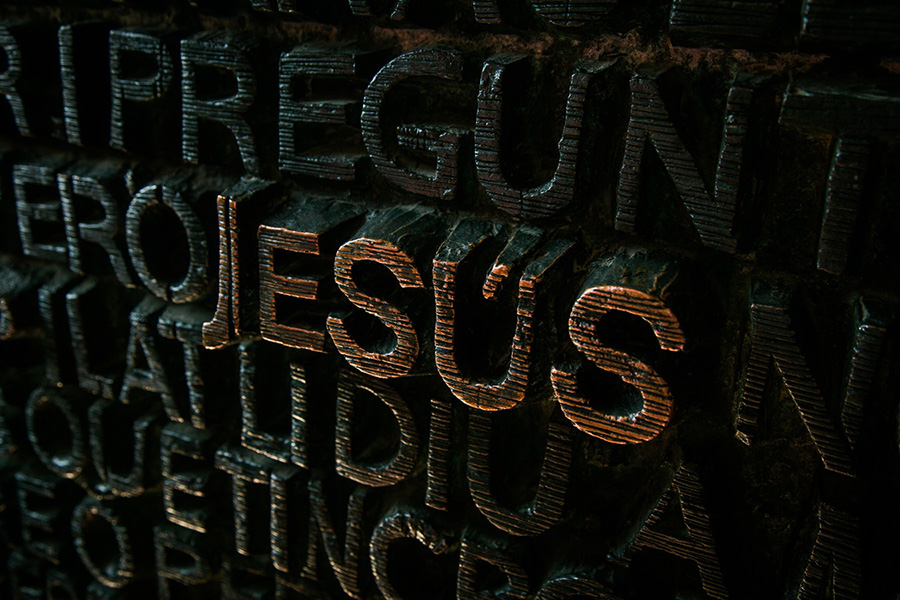November 26, 2023
The Rev. Canon Marianne W. Borg
Trinity Episcopal Church, Bend, Oregon
Matthew 25: 31-46
This is Christ the King Sunday. Sometimes called the Reign of Christ Sunday. It is the last Sunday of our current church year. Next Sunday we begin Advent. Advent means to come. Or the arrival of a person or thing or event. So, advent anticipates Jesus coming again. His second coming. This Sunday’s themes foretell an end time judgement and the coming reign of Christ, and the true kingship of Christ when the kingdom of Jesus will come into its fulness.
The feast day of Christ the King is a late development. It wasn’t instituted until 1925. By Pope Pius XI. The Anglican church followed the Roman Church’s lead.
So what is the true kingship of Christ? What kind of king do we imagine Jesus would be?
Well, to give Jesus the title King is a bit of a brain teaser. Jesus you will recall burlesqued kingship. He mocked it. He mocked Caesar. And Caesar hated that. For Jesus the power and authority of Caesar’s kingship was the epitome of the tyranny of the crown, the tyranny of the throne. It positioned Caesar in such a way that he could exploit and oppress and preserve the ruling elite. The system under the kingship of Caesar favored maybe the top two percent. Jesus and his followers contrasted the Kingship of Caesar to the kingdom of God which was nothing like the kingdom of Caesar. Nothing like it.
And Jesus did not call himself King. His followers did. And some others. But Jesus did not call himself a king. Even as a parody.
Jesus was a peasant, a nobody. But he was a rabble rouser with a compelling counter vision and counter narrative to the establishment’s. His untamed and uncanny powers of healing attracted crowds. His presence and authority was perceived as rivaling Caesar’s. Where did he get this authority? To call Jesus of Nazareth King was a mockery and insult to Caesar. And Jesus and his followers got in trouble for this.
So this Sunday, Christ the King Sunday, is about the coming judgement against the ruling Kingship of the day. And the expectation that something new is happening.
So what does Jesus as King of Kings and Lord of Lords, as our collect today puts it, suggest?
Certainly not Jesus on Caesar’s throne. Let me say that again. Certainly not Jesus on Caesar’s throne. It’s not like if we just get our guy in there it will be all right. A throne presupposes an entire system of hierarchy and control from the top. A throne is hardly the place where Jesus would sit. Nor God for that matter. In our time we are a people who resisted the tyranny of the throne. And we caution against the tyranny of the crown. So we know something about this.
The architecture or means of the kingdom of God is nothing like the architecture and means of the kingdom of Caesar. But the architecture of our own faith, and our own country right now, suggests we still struggle against it.
The gospel for this Christ the King Sunday is taken from Matthew. Selected for this feast day. It is an interesting choice. Matthew was big on kingship. It is Matthew’s genealogy that traces Jesus’ ancestry to kings. ( Luke’s genealogy, by the way, traces Jesus’ ancestry to the prophets.) Matthew believed Jesus would return as the sovereign king. Kingship was the model Matthew understood for power and authority and sovereignty. So Matthew prepares the throne for the coming of Jesus.
The first part of Matthew’s story is marvelous. The second part, however, should cause us to tremble.
Matthew tells a story about a king who proclaims blessing on those who gave food to the hungry and drink to the thirsty and welcomed the stranger and clothed the naked, and cared for the sick and visited those in prison. You will inherit my kingdom, he says. Because what you did to the least of these you did unto me.
But those who did these things, at this right hand, here called sheep ( Matthew uses the simile of the sheep and goats in his story because it was considered easy to tell them apart. The sheep are good. The goats bad.) So the sheep say but we never saw you in any of these conditions. This begs for clarification. Just as you did these things unto the most needy in my kingdom you did do those things unto me. Because my people’s suffering is my suffering, my people’s injustices I experience as if they were my own, their consolation is my consolation, their healing is my healing. So you, blessed ones, are the kingdom’s rightful heirs. You will inherit my kingdom. You are already its good stewards. How you care for one another fulfills my vision for what I want this kingdom to be.
Acts of compassion, kindness, care, hospitality, forgiveness given and given again. No questions asked. No conditions required. These acts are not a calculous. They are not transactional or some quid pro quo. An apt description don’t you think of what goes on in the kingdom of God? This work of unconditional care can undo the ravages of time and an unjust system. The needs of humanity call upon humanity itself for comfort and even salvation. Here love and compassion is worthy of the name of God.
And do we not love because we love. Care because we care. We don’t need justification. We don’t need a why. We love because we love. Isn’t this who we are. At our depths. At our truest. And isn’t this the foundation for the kingdom of God. A humane humanity.
And isn’t this a vision of the kingdom of God we hold before us at all times. In all times.
This first part of Matthews’s story is lovely. Compelling. Affirming. Of God and us. For this we rise up. Wouldn’t you say so?
But look where the stories goes next.
The king turns to those on his left who did not give food or drink or clothing to those in need or welcome the stranger or visit those in prison, here called goats, and says you, goats, who did not give drink or food or clothing or welcome or hospitality, you did not do these things to me either.
And they too respond saying we didn’t see you in any of these conditions. And the king says without skipping a beat, you are accursed. I cast you into the eternal fire prepared for the devil and his angels. You, depart into the realm of eternal punishment.
For me this is where the story ruins itself.
Matthew in his fervor might be trying to say to his audience and to followers of Jesus that caring for one another is really, really important. To not show care and compassion can have terrible consequences. To neglect or ignore the needy is tantamount to contributing to their death. And I am going to commit those goats to eternal fiery punishment. It’s like the king is saying to “the least of these” I am your retribution. But this sounds more like the threat of the kingdom of Caesar than the terms of the kingdom of God.
Now I know this is a story. And perhaps Matthew is indulging in hyperbole. For a rhetorical punch. But it is a disturbing move. Is this the same king we heard from in part one? Because to my reading this second action of the king questions the very nature and character of the king. The actions or inactions of compassion and care are now exposed as a transactional proposition of reward and punishment. If you do these things you are rewarded. With and in the kingdom. If you don’t do these things you are damned to hell fire. Forever.
And consider the punishment of eternal damnation. A suffering so horrible that nothing will ever free you from pain and suffering. Not even death. This is really a horrific idea. Violent. A violence that never ends. This is brutal. Vicious. Sadistic.
I can’t believe this is God’s idea. Or I’m out of this business.
And if God or any king or any leader allows, even sanctions, this kind of punishment and atrocity, then it gives us permission to do the same. Even in the name of God.
That Matthew wrote this doesn’t make it right or somehow workable.
Matthew chose a rhetorical strategy to underscore how important it is we love one another. But I say he borrowed the strategy of Caesar the strongman. Not Jesus Strongmen intimidate their people. They do so with some noble cause. And strongmen say their cause is your cause. But listen carefully. What they really want is to occupy the throne. The cause is not about you. It’s about them.
Matthew makes a case for the kingdom of God but ends up using the tactics of the kingdom of Caesar. He holds up compassion. But threatens with violence. A story about unconditional love has become a cautionary tale.
Matthew doesn’t seem fully convinced that treating one another with unconditional regard is strong enough to correct or counteract our ills.
Are we? Are we convinced by the power of unconditional love? Or do we think unconditional love is, well, just too weak?
Christ the King Sunday. Or the Reign of Christ Sunday. We are talking about Jesus as King of Kings and Lord of Lords.
In some ways this is the perfect text for Christ the King Sunday. It asks us how we imagine Christ as King. Or Jesus as king. Or God as king. As if they ever were. As if they ever will will be.




I am in total agreement with your discussion on this subject. I wonder and ponder the true story of many biblical writings. However, considering the culture, the history, the religions the politics – the people of ” that time and place is it feasible to consider these writings a reflection of both the love of God for mankind and the yet to be realized potential for living that love with no temptation to turn it all upside down and to destroy the “other,”. How often do we” miss the point ” How often do we bring all our ” baggage ” into the “light” and fail to even realize that we are still blind. Sheep vs goats/ dogs vs cats. All are lovely . All are loved. All are welcome . No king, no kingdom, no dictator, No word – in any of our languages to proclaim the name of this Love, this Compassion, this Truth, this Light that is the source and the promise of LIFE. We do not understand . Yet we are forgiven for and in our ” blindness ,” And we can learn to understand and to forgive our own blindness and that of those – like the goats in the strange story written so long ago.
u
Thanks so much, Marianne, for your clarity and for your courage in suggesting that Matthew could be wrong. The inconsistency in this passage has bothered me for years.
Is not the problem with this text that the term king calls up an anthropomorphic image of God? If we think instead of God as Mind, Spirit, Truth, Love, etc., we may see that neither are spiritual laws anthropomorphic. Their motive power is Love. Their strength is Truth. Obedience in harmony with such laws on the human scene brings consequences.
So does disobedience, out of step with these laws, at some point bring consequences. If we read Matthew in the context of universal Good, there is no vindictiveness on the part of the Law giver, no personal judgement. We make our own bed and must lie in it, as the saying goes.
Thank you for the opportunity to think some more!
Excellent and clear testimoney against the colonical atttitude in religion. Thank you.
Bruce
I think you nailed it in your comments about the nature of love and compassion,
but throughout the sermon you referred to God as “He” and of course as Jesus as “King”. For several years, I’ve been struggling to explain what or who God is.
I think , for example, calling God the Father, is missing the point unless we precede by explaining that the Father is really a metaphor and that this spirit that we call God is clearer in a simile, God can be like a father.
I recognize that taking a few verses out of context can be a dangerous and misleading way to get to the truth, but here’s how I’ve tried to justify my belief that God, is in essence or reality, a spirit. This truth is made specific in the
Gospel of John: 4:24. I’m not going to quote the scriptures because I’m certain you have a copy of the New Testament by your late husband, “Evolution of the Word.”
Secondly, in I John Chapter 4, we are told God is Love. Now as a simple as mathematical like equation, if “God is “Spirit” and “God is Love.” then the spirit of God equals Love.
I conclude my spiritual journey with Paul’s I Corinthians: 13, where Paul tells human beings how they should encompass this Spirit of Love in their lives.
I think preachers need to refer to God as a spirit, perhaps using the pronoun “it”, not as father or king. God is not a personification of a human regardless of the position in life we choose for it. God actually is the Spirit of love.
I’ve been working this through for many years, but this is the first time I’ve had the opportunity to articulate it to a leader of the contemporary Jesus crowd who might understand what I’m trying to understand.
Philip O. Main